Peter MALONE
Saturday, 18 September 2021 19:29
Born to Win
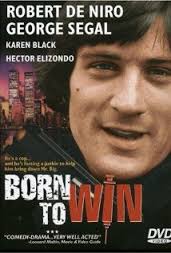
BORN TO WIN
US, 1971, 90 minutes, Colour.
George Segal, Karen Black, Paula Prentiss, Jay Fletcher, Hector Elizondo, Robert de Niro.
Directed by Ivan Passer.
Born to Win is a very grim film, about drug addiction. It came early in the piece for films about addiction. The previous year Panic in Needle Park had appeared with Al Pacino.
The film was directed by Ivan Passar, a Czech director who had flourished in Czechoslovakia during the 1960s but had moved away from his country to avoid the crackdown in the mid-60s. Like Milos Forman, he began a career in Hollywood. Other directors of the time like Jirí Menzel remained and continued to make films in Czechoslovakia.
Ivan Passer did not have a very prolific career, making a number of smaller and minor films like Silver Bears, Ace Up My Sleeve, Carter’s Way. However, he persevered, made a television remake of Picnic in 2000 and was filming in Kazakhstan and France in 2005.
George Segal had emerged as a prominent star in the 1960s with The Victors, Who’s Afraid of Virginia Woolf. At this time he appeared in The Owl and the Pussycat with Barbra Streisand. Karen Black had also made an impact with such films as Five Easy Pieces. Hector Elizondo and Robert de Niro appear in supporting roles.
This is an almost unrelieved film about the realities of addiction. Segal portrays an ordinary man caught up with drugs, his day-to-day life, his relationship with Karen Black – but, when the chips are down, he chooses drugs. An alternate and perhaps more appropriate title was Born to Lose.
1. The film's reputation, a Czech director making his American debut, a Czech viewpoint of America? How satisfying, how alien?
2. The presentation of the drug culture of 1970-71? In comparison with other films of the time? The atmosphere of reporting, the insights into the drug culture, world, individuals, police work, danger to society?
3. The irony of the title, its tattoo on J.Ps arm? The reference during the film? The irony and a pessimistic outlook on life?
4. The importance of the atmosphere of New York as a city, a grim city, its streets and its buildings, the world of drugs and the pushers, the money makers, the exploiters, the violent ones? The police and detection? A picture of America, a picture of world society and the influence of drugs? An important environment for the characters and issues?
5. The film's attitude towards drugs and their pushing? The evil, the effects on the individual, money, petty crime, exploitation, the ruining of people's lives?
6. George Segal’s performance as J.M.? Strengths and weaknesses of character? His opting out, his hairdressing work? His flip attitudes, serious cravings? His roaming New York, criminal involvement? The breaking of his marriage with Veronica and the significance of their meetings and her profession? His reliance on Billy and the bonds of friendship? The breaking of this with the pathos of Billy's death? The realization that it could have been his own? Contacts with the Greek and exploitation? The humiliation of pleading for drugs? Being dependent on the whims of others? Wandering the city, suffering, need? His not caring about life, the sequences of him sitting and wandering? The devices that he had to resort to to get money or drugs? His being in the power of criminals? Under suspicion by the police? Being used as a decoy by the police and open to police pressure?
7. The details of the incidents in which he was involved: his wandering. work, carrying, decoy for the police? The danger in which he lived as illustrated by Billy's death?
8. The world of Parm: Karen Black’s style, as a character in herself, the way that she met J.J., the bonds between them, the ironic love and sex (what he wore to bed?), the building of a relationship? Parm and her attitude towards the drugs? The irony of her being framed and betrayed by J.J.?
9. The Greek and the world of the pusher, suave extortioner, his hold over people, his shrewdness in not allowing himself to be detected by the police? His willingness to frame others and kill them?
10. How sympathetic the portrayal of police work? How critical? Violence, undercover work? The setting up of the situation to trap the Greek and J.J’s involvement? The danger to the undercover man? The pressure on Parm and audience disgust with the police?
11. Sequences such an J.J’s visiting Marlene and her husband and trying to persuade her for the drugs? Brutality, blackmail?
12. The comic touches and the tragic touches? A satisfactory or odd blend? The sharpness of observation? How was the insight into situation and character? Was the film particularly moralizing?
Published in Movie Reviews
Published in
Movie Reviews
Tagged under
Saturday, 18 September 2021 19:29
Born Losers
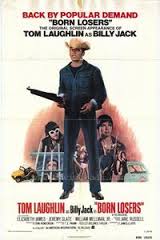
BORN LOSERS
US, 1967, 113 minutes, Colour.
Tom Laughlin, Elizabeth James, Jeremy Slate, William Wellman Jr, Jack Starrett.
Directed by Tom Laughlin.
The Born Losers has had a very strange history of release and distribution. It was one of the earliest of the bikie films and appeared in America in 1966. It was held up in an overseas release because of the crude brutality and censorship problems. However it was released in some countries in a cut version in 1970 after the success of Easy Rider.
However, it was more of a film related to American International bikie pictures like The Wild Angels or Hells Angels and the very many films made in the late 60's along these lines. It was rejected by most critics.
However in 1971 Billy Jack was released and received great praise and popular acclaim. It was then discovered that
the Billy Jack character was introduced in The Born Losers, and the film was produced by Delores Taylor who played Jean in the Billy Jack films and starred and was directed by Tom Laughlin who also made these films. This meant a reappraisal of the Born Losers and linking it with the Billy Jack films rather than merely with the bikie films. The Born Losers then had rehabilitation. It was not released in England until 1975.
Perhaps there are more redeeming features in the Born Losers than was first considered. It certainly must be seen in the light of the Billy Jack films.
1. The overall impact of this film? As belonging to the motorcycle films of the sixties? Its impact now? The appeal of the ‘bikie’ films, their violence? The bikie way of life and freedom and individuality? How well did the film portray this, exploit it? The film as a cultural mirror of the mid-sixties?
2. The impact of the character of Billy Jack and the later development of this character? How were the origins of his cult seen here? The values that Billy Jack stood for? How well and strongly?
3. The quality of the film-making, the acting? The aims and motivations of the film-makers? How noble, how moralizing? How successful in the moralizing aims?
4. The significance of the title and the indication of themes? Billy lack ultimately as a winner?
5. The portrayal of Billy Jack as a hero? The Vietnam background, the half-breed background? The complications of America and race? Racism? Billy Jack and his stands on law and order? The individual, isolated,
yet standing for justice? The use of violence and the preaching of non violence? How strong a personality, the protector and saviour? The reason for his wide appeal?
6. The portrayal of the 'Hell's Angels' bikies? Their strengths and weaknesses? The values, the cynicism? The ugliness In the world of these bikies? What values in modern society were they exploiting, reacting against? Danny and his mindless violence? The brutality and its illustration? The characters and personalities of the other members of the gang?
7. The contrast of Billy Jack defending the innocent and the fearful townspeople? The message about appeasement and non-violence? A symbol of American society?
8. The ugliness of the rape, the pressures on people, the terrorizing by the gang? The girl's reactions and its portrayal?
9. The sequence of Jodell and her mother, the testifying and then the backing down?
10. Vicki as the heroine of the film? Her strengths, fear? Her being saved by Billy Jack? Her compromising with Danny in order to be safe?
11. Billy Jack's shooting Danny? The impact of the violence? What right had he to kill? His motivations? Audience reaction to this test of law and justice?
12. How satisfying was the resolution? How does this film stand now In comparison with other bikie films of the time, in the light of the other Billy Jack films?
Published in Movie Reviews
Published in
Movie Reviews
Tagged under
Saturday, 18 September 2021 19:29
Born Innocent
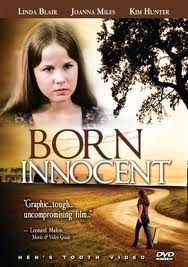
BORN INNOCENT
US, 1974, 98 minutes, Colour.
Linda Blair, Joanna Miles, Kim Hunter, Richard Jaeckel, Allyn Ann Mc Lerie, Mary Murphy, Nora Heflin.
Directed by Donald Wrye.
Born Innocent is an early telemovie. It features Linda Blair, the year after she made The Exorcist. It also has a strong supporting cast of women character actors including Oscar winner Kim Hunter and musical comedy star Allyn Ann Mc Lerie.
Linda Blair portrays a troubled teenager who is raped. She is abused by her family, goes into care, becomes a victim of the bureaucracy, the uncaring attitudes of the authorities. However, a counsellor has some faith in her and tries to rehabilitate her and set her on a course for life.
There were several films like this in the 1970s, a mixture of exploitation for the time as well as being moralising about the possibilities for a better life. These films acted as a kind of cautionary tale.
1. The impact of the film, as a telemovie, for home viewing?
2. The technical aspects of the film, TV styles, close-ups etc.? The importance of the content for home viewing and the audience ability to take it? American audience, overseas audience?
3. How strong were the themes and presentation for such viewing? How effective the communication, jolting, sympathies, resolution, for social change?
4. Irony of the title and its reference to family, the institution, past, future? The pathos of the title and the ending?
5. The immediate impact of Chris Parker and audience response to her as presented? The background of her
running away, official reaction to her, audience puzzle about her as a person, motivations? Did she elicit sympathy or not? Should she have?
6. The importance of showing what happened to her overnight after her detainment? The details of the prison, the types of people there, beds, the graffiti down the wall, the look on the women's faces? Treatment by police? Interrogation? The fact that she had been signed away by her parents? The importance of the court sequence - sympathy of the judge but his not being able to do anything else? Was this true? The preparation for the institution by Josie and the other girls?
7. The presentation of the institute - was this fair? The buildings, rooms and corridors, dining room, classrooms, work done, group work outside, classes? The personnel - the officials? The staff? The house mother and her attitude, had been in the job so long? Hardness? softness? The tradition of harshness in the past, more humane changes? The humiliation of being searched and the reasons? The rooms, the dormitories, the girls and their suspicions and hostility, capacity for violence and hatred, their varying background - abandonment, prostitution, beating? How credible was this presentation of the institution? What reaction was wanted from viewers?
8. How well did the audience get to know Chris? The reasons for her running away, the relationship with her parents, her revulsion at the institute? The fact that she was still as yet innocent and could be redeemed? The importance of the classes where she knew the answers? The teacher and the possibility of communication? Her beating and being, hurt, the build-up resentment and her running away, her being put in solitary? Audience reaction to solitary?
9. The fact that she could communicate with the teacher, that there was still hope, the discussion with the staff about her going home?
10. How depressing were the sequences at home? Her father, his erratic moods, reaction to his wife, criticism of his son, of Chris? Fights between husband and wife? The weak mother, her love, inability to cope with her daughter, the fact that they offered no help? Chris had hopes and their not being successful? The father’s suspicions of her being out for four hours and hitting her? Her decision to go to her brother and the hurt that he was not able to help her? Should he have, could he have?
11. The inevitability of her return? Her resentment. her hardening? How credible was this?
12. The rejection of the house mother, solitary? The teacher still trying to communicate? The Board trying to decide what should be done?
13. The focus of the pregnant girl, the chance for Christine actually to help her and be kind? Solitary, the death and the pain? The funeral and its bitterness?
14. The build-up to the riot, its violence, communication to the other, hysteria, against the house mother, Christine’s place in it? Denny? Denny and the throwback to the visiting day and her being hurt?
15. Christine’s explanation to the Board, her lying and her hardness, the teacher helping through this?
16. The pathos of the ending? Christine going up hardened like all the other girls? Her future? Bitterness? Who is to blame - parents, society, the institute, the staff, herself? The teacher looking with anxiety and sadness to her? The audience sharing this gaze with the teacher?
17. How vividly portrayed were social themes, American society? Society throughout the world, the defects of family, the plight of the children, influence of the parents, the world of evil and crime?
Published in Movie Reviews
Published in
Movie Reviews
Tagged under
Saturday, 18 September 2021 19:29
Betsy, The
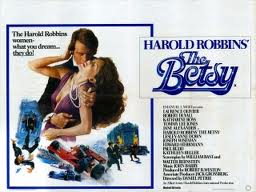
THE BETSY
US, 1978, 125 minutes, Colour.
Laurence Olivier, Robert Duvall, Katharine Ross, Tommy Lee Jones, Jane Alexander, Lesley- Anne Down, Joseph Wiseman, Kathleen Beller, Edward Herrmann, Paul Rudd, Richard Venture.
Directed by Daniel Petrie.
At the time of its release The Betsy was considered one of the great Hollywood examples of popular soap opera, the trash movie. Since it was based on a trash novel by Harold Robbins (The Carpetbaggers), it fulfilled all the expectations of high class trash.
The film is focused on a very rich family and its goings-on … The advertising highlighted sex, love, murder, betrayal. Added to that is its setting in the car industry and the politics of production of automobiles in the US and its history.
Where the film stands out is in its extraordinarily high-powered cast led by Laurence Olivier with Robert Duvall as his son. Tommy Lee Jones is the central character an Katharine Ross and Lesley- Anne Down supply the romance. Veteran Jane Alexander is also part of the cast.
The film was directed by Daniel Petrie who began working in television in the 1940s. He made his first film for the big screen almost thirty years later with Lifeguard. However, he continued making films for television until 2001 with Wild Iris (with Gena Rowlands and Laura Linney). Some of his later telemovies were quite significant including The Execution of Raymond Graham, My Name is Bill W., Inherit the Wind. In the early 80s he made interesting films like Fort Apache The Bronx and The Dollmaker.
1. An entertaining soap opera? The value of this kind of film - an entertainment, Americana?
2. The world of Harold Robbins? His melodramatic, pot-boiling seamy style? Cardboard characters, superficial and seamy situations? The critical attack on Robbins and his world and characters? How adequate the cinematic version of a Harold Robbins novel - content, character sketch, situations, problems and issues, style?
3. The film and the style of the seventies-slick, permissive, touching on controversial subjects in a glossy and sensational kind of way? Or not? The importance of the leading actors and their reputations, their being in a film of this kind? How strong the treatment of issues, tone?
4. The importance of the structure with the focus on the mid-seventies? A film of the seventies in exploring contemporary types, issues, big business, power struggles? The relationship with American industry, conservation, the energy crisis? The going back to the early thirties and the contrast of the Depression, power, the self-made man, the tycoons, the car industry and its subsequent history in America? The inter-play on the business level between past and present, on the family and emotional level? How satisfying emotionally for audience involvement was this structure?
5. How well drawn were the characters? Did they develop throughout the film? How real, contrived? Their dialogue as that of the best seller or of real life? The contrived situations and the way these were handled? The emphasis on power play, sexual problems, manners, morals?
6. The depth of treatment of these family situations, business situations?
7. The initial focus on Angelo - the modern young man? How attractive, callow? Seeing him driving and the symbolism of the racing car and what it represented to Angelo and his drive? The relationship between Angelo and the Hardiman family? The antagonism with Loren the Third? The attachment of Loren No. 1? The later revelation of the reasons for this interest? The old man's patronage, the Betsy in it? Angelo and his testing of The Betsy? His being drawn into the family, the patronage of the old man, the attraction of Betsy herself? The clash with Loren and his aides? The potential for a successful hero? How did he develop throughout the film? A new man but echoing and paralleling the ways of the Hardimans? Audience sympathy with him throughout the film? At the end?
8. The film's focus on Loren Hardiman the First? Seeing him in his old age, his role in the firm, spying on the family and on Angelo, his ways of control and his manner, way of speaking, his love for care and his interest in that angle of his industry, the patronage of Angelo, the Board meetings and his manipulation of votes, the people against him? His outwitting people, his being outwitted and yet winning? His attachment to Angelo, the gradual revelation of his despising of his son, the antagonism towards his grandson? The importance of Laurence Olivier's interpretation of this role?
9. Loren Hardiman as representing the 20th century American type? More sympathetic in his old age, giving up some of his power, the emphasis on power and sexuality and his liaison with the maid? The background of his memories? His wife, his son and his disappointment in him, his manipulating his friend's death? The way that he ran his son’s life, the trip etc.? His relationship with Sally and her presence in the family? The liaison with Sally? The antagonism towards Warren? The background of the Mafia connections at the same time and the connection with Angelo through these Mafia connections? Did audience response to the old man change in seeing him in his middle-age?
10. The film's portrait of Angelo as he moved within the Hardiman family - the new man, his relationship with the nurse, with Betsy and the flirtation? The reason for his taking up with Bobby? San Francisco, work? His manoeuvring of shares, the social life, the party sequence? The tests? The violence that he was subjected to? The gradual deepening of the motivation of revenge, the choices presented to him and his option of winning? Reflecting the seventies American tycoon type bent on success? The film's estimation of him?
11. The portrait of Loren the Second in the background of the 30's of the Depression? His growing up in relationship with his father, his father's attitude towards his weakness? The elaborate preparations for the wedding? Sally's personality and presence, the marriage, the failure of the marriage? The suggestions of friendship with Warren, the build-up of their liaison, the blackmail? The importance of the Depression and the strong issues of the strikers and the workers? His mishandling of the situation? His father's disgust? The inevitability of his suicide? The irony of Sally and her seeing the maid and the liaison with Loren, No. 1? The build-up and the overtones of incest in her liaison with the old man? Her departure from the scone? How well drawn and credible was the character of Sally?
12. The setting up of Loren the Third as the villain of the film? The slick and efficient businessman of the seventies? Seeing him at work, Board meetings, squash games, reliance on his advisors? His hardness, his attitude towards finance, towards control? His outplaying himself because of his antagonism towards his wife? Her vengeance towards him? The liaison with Bobby, losing her to Angelo? His spies, the party sequence? The build-up to his defeat and his place within the firm and family at the end? Being outwitted by the new man?
13. The character sketch of Alicia and the credibility of the neglected and hurt wife? Her growing hardness and her being on Angelo’s side for voting? Bobby and the fashionable English jet-setter? Her relationship with Loren the Third, with Angelo? The character sketch of Betsy as the potentially charming young girl, as the future Alicia or the future Bobby? The portrait of women including Sally in the world of Harold Robbins?
14. How authentic was the Detroit background of the automobile industry - in the thirties, the seventies? The sequence of the tour of the factory, the details of how the factory worked? John and the attention to detail on the car? The sequences with the building of The Betsy, the testing of it? Sabotage and the ugly reality of industrial espionage and death?
15. How well integrated were the Mafia themes - old Angelo and his relationship to Loren, doing his dirty work, being deported? Jake and his long memory and his hold over Loren, liaison with Angelo? The ugly complications of big business? Lack of scruple in the power game?
16. How enjoyable is this kind of complex pot-boiling plot, the audience carried along by the momentum of the plot, enjoying it? The standard of values explored and presented? A glimpse of an American genre of melodrama and soap opera, reflecting contemporary America?
Published in Movie Reviews
Published in
Movie Reviews
Tagged under
Saturday, 18 September 2021 19:29
Betrayed / 1954
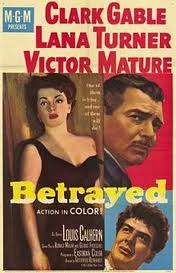
BETRAYED
US, 1954, 108 minutes, Colour.
Clark Gable, Lana Turner, Victor Mature, Louis Calhern, O.E. Hasse, Wilfrid Hyde- White, Ian Carmichael, Niall Mac Ginnis, Norah Swinburne, Roland Culver.
Directed by Gottfried Reinhardt.
Betrayed is a very interesting and rather glamorous spy story, set in Holland during World War Two. The film uses the Dutch landscapes to great advantage.
The film focuses on Clark Gable as a Dutch intelligence officer, Lana Turner as a widow who is considered to have collaborated with the Nazis and who wants to vindicate her reputation by serving as a spy for the allies, and Victor Mature as a local Resistance fighter. The three stars work very well together and are supported by Louis Calhern and a group of English actors. The film was directed by Gottfried Reinhardt, who directed Invitation and The Story of Three Loves in Hollywood and then returned to Germany to make a few films.
The film was made within ten years of the end of the war, so memories of the Resistance and betrayal were very much to the fore. Audiences who have seen Paul Verhoeven’s The Black Book (2006) with its story of a woman who is able to act as a double agent and get information for the allies and Dutch Resistance but is betrayed by somebody from the Resistance will realise that there are strong similarities in the screenplays of the two films.
Clark Gable was moving towards the end of his career and had just made Mogambo with Ava Gardner and Grace Kelly. He was to freelance for the next six years before dying in 1960, his last film being The Misfits with Marilyn Monroe. Lana Turner was at the peak of her glamorous screen presence during the 1950s after being a glamour girl as well as a femme fatale in the 1940s. She was to continue to act as older women in such films as Peyton Place in the 50s and Madame X in the 1960s. At this time Victor Mature made The Robe and Demetrius and the Gladiators.
1. Was this a successful war fi1m? Its impact in the fifties - ten years after the war, its impact now? The nations involved and attitudes towards them now?
2. What did the film have to say about patriotism? The Dutch and their support for occupied Holland? The Germans as the occupiers? The United States and Britain as helpers of the Dutch? The importance of loyalty for the Dutch?
3. How did the film portray spying? Wan it interesting. realistic or far-fetched? The dangers of spying, the arrests, the effect on people’s lives, the detailed training, keeping one's wits, the unpredictable? How necessary is spying during a war? Why?
4. What did the film have to say about betrayal? The temptation to disloyalty and saving oneself, the possibilities of betrayal for each of the main characters? What judgment did the film make about betrayal? Was this convincing? did it correspond to suspense in the film?
5. How important was the Dutch setting, the scenery, the towns, the various locations, the importance of the Dutch Resistance and their style?
6. Peter Deventer, a suitable hero for the film? Clark Gable’s style, was he ever suspected of disloyalty? The importance of his communication at the beginning, his capture, interrogation, his judgment on characters, especially of the German Commander, his escape? The importance that hostages gave their lives for him? His concern and plan for espionage? His training of Carla? His emotional involvement with her, his doubts about her, his saving her at the end? Was his character well explored or was he conventional?
7. Carla, Lana Turner’s performance, the background of the easy life in Holland, the impact of her husband dying as a hostage, her dedication to her work and training, the hard interrogation by Deventer, her collaboration with 'The Scarf’, the impact of the massacre of the Germans, her emotional response to Deventer, the temptation to betrayal and her awareness of ‘The Scarf’? Her atoning for her husband's death and her way of life? Was she a convincing character?
8. Was ‘The Scarf’ a credible character? His schoolboy attitude towards Resistance? His love of adventure and leading his men? Independence? His behaviour towards Carla? His attitude towards his mother and the disillusionment when her head was shaved? Was this convincing for him to become a traitor? To execute so many of his fellow Resistance men? The nature of his dramatics with the Germans? The melodrama of his death?
9. How well drawn wore the British military people, the American General, the German General and his exploits, his ultimate death?
10. How successful an adventure film was this? How well did it present its main themes?
Published in Movie Reviews
Published in
Movie Reviews
Tagged under
Saturday, 18 September 2021 19:29
Betrayal
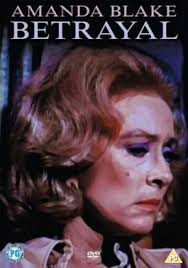
BETRAYAL
US, 1974, 74 minutes, Colour.
Amanda Blake, Tisha Sterling, Dick Haymes, Sam Groom.
Directed by Gordon Hessler.
An interesting and effective telemovie. It borrows its plot from the old story of the Kind Lady - the servant ingratiating herself into the friendship of a rich old lady, with intent to rob. The central character in this film is well played by Amanda Blake, star of Gunsmoke. The central role of the servant is taken by Ann Sothern's daughter Tisha Sterling, who is quite credible in the central role, even if with the brief running space of the film, she has to change and develop her motivation. Sam Groom is an above average, suave villain. There is a piece of surprise casting with Dick Haymes, the popular crooner of the forties, playing an elderly judge. Nothing particularly new, but well done of its kind.
1. The entertainment value of tele-movies, their dramatic effect in the home? Suspense? Moral values and issues?
2. How well drawn was the plot, the effectiveness of the opening and the establishing of Gretchen as Mrs Russell's servant, the robbery, the revelation of the truth about Gretchen and Jay, Mrs Russell's death? The introduction to characters, situations? Pension? The irony of the audience knowing what was to happen before it happened? Audience involvement in the characters, situations? The effectiveness of this brief introduction?
3. The American style of the film - the American world, California, wealthy people, society, violence, crime?
4. The ambiguity of the moral judgments made during the opening? The judgments on Gretchen? Revulsion at the murder? The testing of these attitudes throughout the film?
5. Gretchen and her brain work, her work with the old ladies, her planning? Things going wrong and her ability to cope? Disguise? Connections with Jay? Her reaction to Mrs Russell's death? Jay and his reliance on Gretchen? His being her reference by phone? His callow violence, especially in Mrs Russell's death?
6. The brief characterisation of Mrs Russell, the companion, fear, the message to her daughter, the murder?
7. Audience reaction to the setting up of Helen Mercer? Gretchen's plan, arrival, things going askew, Gretchen's not anticipating the human element, it being too late to change, Jay's arrival, his daring attitudes towards Helen, Gretchen and her having to manipulate the situation? The audience's changing attitude towards Gretchen?
8. The initial impact of Helen, strong character, mellowing when the audience got to know her, the story about her husband and her marriage, the shooting and its effect? The Judge and his attentions? Helen's social life, her business sense, her designing? her friends? The dog - and Jay's later killing it? Her making Gretchen welcome, the house, shopping? The growing conversations and the genuine attitudes of Helen towards Gretchen? Her welcome to Jay to stay in the house? The build-up to the confrontation with Jay, the terror in the house, shooting and the same situation occurring? The credibility of her judgment to hide the body? Her puzzle about Gretchen, wanting to share the responsibility with Gretchen? The end and the pain of her understanding the truth? How well drawn a character? The focus of the title on her?
9. The comparison of the characterisation of Gretchen? First judgments on her, her disguise, lies, cruelty? Connections with Jay? Her capacity for improvisation? The friendship with Helen, its effect on her? Jay's arrival and her story, the tensions at the dinner, Jay and his boasting? The dance and her enjoyment of it, her interest in Helen's shop? The possibilities of the future? The questions about the body, the police? Her planning to help Helen and escape? The irony of her being caught by Jay's set-up? Her surrender, her future? Conscience questions? An opportunity for reform? The bonds with Helen?
10. Jay and his callowness, shooting Mrs Russell, posing as the doctor, his arrival at the house and his posing as the author, claiming acquaintance with Helen's friends, planning to rob the house, chasing Helen around the house, the irony of his death? The irony of his setting up the gun for Gretchen and her being caught by it?
11. The Judge and his pleasant attentions, the background of San Francisco society?
12. The build-up of the friendship between the two women, detail and warmth, irony? The parallels of the killings, the concealment? The control of each over the other? The loneliness? The mutual saving of each other? The betrayal of the title?
13. How effective was the drama, characterisation, plot interest? Issues for reflection?
Published in Movie Reviews
Published in
Movie Reviews
Tagged under
Saturday, 18 September 2021 19:29
Bete Humaine, La
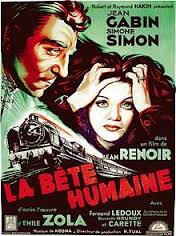
LA BETE HUMAINE
France, 1938, 100 minutes, Black and white.
Jean Gabin, Simone Simon.
Directed by Jean Renoir.
La Bete Humaine is a classic film version of Emile Zola’s novel. Directed by the great French director Jean Renoir, it features Jean Gabin at the peak of his pre-war career. It was the period of Pope Le Moko. Zola’s grim story, with a railway setting, is one of man-woman relationships, madness, revenge and murder.. The film shows the obsession of the man, the wiliness of the woman, the inevitable violence.
Fritz Lang remade this story with an American setting as Human Desire, with Glenn Ford, Gloria Grahame and Broderick Crawford, In 1954.
1. The status of the film as a French classic? The work and reputation of the director? Of Jean Gabin? A classic French film of the thirties?
2. The reputation of Emile Zola and the opening, the prologue and its explanation, the tribute to Zola? His insight into France of the 19th and 20th centuries? To the French character, problems?
3. The quality of the black and white photography, the re-creation of France, of the provinces, the importance of the railway and its atmosphere, the style in which it was filmed, trains, stations, yards, railway workings etc.?
4. How insightful was the film in its analysis of motivations for good, for evil? Its premise about the nature of evil, the title and man as a human beast? How pessimistic the outlook?
5. The hero in himself, his qualities, his evil? The importance of his sickness and violence? The sexual overtones and undertones? Family background, the human side of him, his infatuation? His capacity for evil, love, complicity to murder, deceit? How responsible was he for his actions?
6. The contrast of the station master and his strengths and weaknesses of character, his ambitions yet being an ordinary man, the importance of his jealousy. cruelty at home, his love and hate for his wife, the imagining of the murder and his carrying it out, the pressures on his wife and turning her against him, his failure to see what was
Happening an regards his wife and her lover, the foolishness which led to his death? How much of ‘a human beast’?
7. The comparison with his wife? The explanation of her background, her strengths and weaknesses of character, her liaison with the authority, her fears, her husband's attitude and his jealousy? Her complicity in the murder and her subservience to her husband? The chance meeting with the hero and the consequences? Co-operation. love and passion? The idea of murder and her persuading the hero? The irony of herself becoming the victim of his madness? How much was she a human beast?
8. The treatment of the basic triangle? Its portrayal of passion in the French context. the consequences of passion of love and hatred?
9. How authentic was the treatment and the filling in of the background of ordinary people, the detailed attention to daily life especially with the railways?
10. The atmosphere of violence and the ugliness of death?
11. Was this a classic film version of a classic novel?
Published in Movie Reviews
Published in
Movie Reviews
Tagged under
Saturday, 18 September 2021 19:29
Best of Everything, The
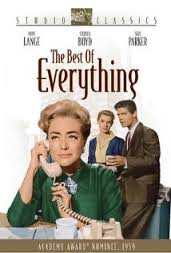
THE BEST OF EVERYTHING
US, 1959, 121 minutes, Colour.
Hope Lange, Stephen Boyd, Suzy Parker, Martha Hyer, Diane Baker, Brian Aherne, Robert Evans, Brett Halsey, Louis Jourdan, Joan Crawford.
Directed by Jean Negulesco.
The Best of Everything is the kind of soap opera that was very popular at the end of the 1950s after the success of such films as Peyton Place, A Certain Feeling, Bonjour Tristesse. It has a large star cast and was directed by Jean Negulesco who also directed some of these films. He had directed some action films and thrillers in the 1940s including The Mask of Dimitrios and Johnny Belinda. With the coming of Cinemascope he made a number of very glossy films including How to Marry a Millionaire, Woman’s World and Three Coins in the Fountain.
This is the world of big business in the late 1940s – a world in which the executives could get away with sexual harassment in a way they could not in later decades! The film follows the fortunes and misfortunes of four young women who have ambitions, who end up going the wrong way, who look for a good man, or who make the best of everything. The stars were the young hopefuls of the period. The men, on the other hand, come out very badly. Stephen Boyd is alcoholic, Louis Jourdan, suave and cruel. Robert Evans is another of the men – at the beginning of a career which led him into production at Paramount and an ambivalent reputation (with documentary insight into his career as actor and producer, The Kid Stays in the Picture).
The film also has Joan Crawford in a supporting role, as the businesswoman who presides over business and the fate of the young women. It is pointed out that her husband, Alfred Steele, the president of Pepsi- Cola, died while the film was in production and that when Joan Crawford took over, art imitated life in terms of her taking control and giving orders to everyone.
1. Why are melodramatic films like this so enjoyable for audiences? What retains the interest: plot complications, the characters, the modern environment, political and emotional relationships, the lush style? Critics call films like this ‘Trash'. Do you agree? why?
2. How important for films like this are colour, widescreen scope, the stars and their personalities, the music, fashions and decor, title song?
3. How successful was the screenplay: in its drawing of characters, use of situations, stock situations and cliches? Did the film explore situations and people or did it remain on the surface? The film is described as 'slick'. Is this accurate?
4. What human. values do films like this stand for? Or do they merely exploit the response to sensational situations and characters?
5. How attractive a heroine was Caroline? The contrast between her at the start and the finish? What changed her? Did she change for the better? Trace the change in her character from a romantic young girl, waiting for her fiancé, ambitious, hard-working, timid, moving through promotions, helping others, falling in love with Mike, becoming harder? Her wanting to be her own mistress and not anybody else’s? Could the audience identify with her and focus the other characters through her? Was the audience satisfied with the happy ending for her?
6. How well portrayed were the other girls: Mary-Agnes? and the typing pool and her chatter, Gregg, April, Barbara? How did they contrast with Caroline and with one another?
7. Was Gregg, a credible character? As a melodramatic actress, moody, ambitious, obsessed? The pathetic nature of her love for David Savage? Why was she not helped more by her friends? Why couldn't she communicate? Was her death believable or too melodramatic?
8. How attractive a girl was April? From Colorado, naive and nice, enjoying life and parties and whatever was offered? Her pushiness, especially towards Dexter? Was it obvious that she would be seduced and used? Was the escaping from the car and her miscarriage credible or contrived? Was it credible that she and the doctor would find true love? Are there girls like April with such stories?
9. How interesting was the character of Amanda? As the strong and severe woman, her bitchiness in treatment of the other girls, their response to her? Did the film say that she was nice underneath: her leaving and the nature of her return? Was there a danger that Caroline would grow into a type like Amanda?
10. Were Barbara and her plight well explored?
11. How good a hero for the film was Mike? His background comments, his drinking, disillusionment? His love for Caroline and continually telling the truth to her? As a kind of chorus for the proceedings?
12. Why was Shalimar introduced into the film? For comedy, the older generation, his attitude toward sex, work? His helping of others? his fear of his job being taken?
13. How conventional a villain was David Savage? Louis Jourdan's suave portrayal? Success as a playwright, his callous attitudes in his affairs, his disregarding Gregg, the impact of her death on him?
14. After this discussion how ironic was the title? The irony of its portrayal of modern America, New York book firms, the modern world of enterprise and success? What values did the film stand for? Are films like this an image of life as lived? The melodramatic and glossy surface of life as lived?
Published in Movie Reviews
Published in
Movie Reviews
Tagged under
Saturday, 18 September 2021 19:29
Bestione, Il
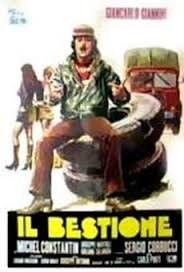
IL BESTIONE
Italy, 1974, 100 minutes, Colour.
Giancarlo Giannini, Michel Constantin.
Directed by Sergio Corbucci.
Il Bestione is the name given to the huge transports, semi-trailers. This is an Italian trucking comedy which is given strength by the presence and performance of Giancarlo Giannini. The film was made early in his career before he became an established star for his many Lena Wertmuller films. He brings the same intensity and skills to this comedy drama.
The film can be compared interestingly with the trucking dramas from other countries, most especially those from the United States which range from Smoky and the Bandit to Truck Stop Women . There are overtones of comedy as well of sexual farce. The comradeship of the truckies, the love of the road are all quite evident here. Direction is by Sergio Corbucci, a maker of generally routine action films with popular Italian stars like Terence Hill and Bud Spencer.
1. The appeal of a trucking comedy-drama? For Italian audiences? World-wide audiences? The increased interest in road films and trucking films in the late seventies?
2. The film as a Giannini vehicle? his presence, style, size? Manner of speaking? his singing the title song? his being a symbol of the Italian male - strong, opinionated, his way with women, his way of dealing with situations? The Italian little man?
3. The Italian background for the film, Italy's place in Europe, the links by transport? Poland, Germany? Colour photography of locations? The sense of movement throughout Europe?
4. he focus of the title, its reference to trucks - and by extension their drivers? The mystique of the truck, its power, movement, function, skill in driving, care by the driver for the truck? A symbol of 20th century man-machine relationship?
5. Themes of the road - the road in the 20th century, distance, direction, movement, wandering, a way of life springing up around the road, the truck stops, the restaurants, stations, the people in these places? Relationships of drivers to these people, disruptive of basic units for example the family? How was this presented in the film -
scenes of driving, fellowship, the visit to the restaurant, the long collage of eating?
6. The personalities of the truckies - the examination for health and all that it meant, success or failure, driving skills, partnerships, the cafes, the code of the road, building up relationships? The clashes, Nino and his fight with the Dutch drivers? Truck drivers like sailors with ports of call, girls in the ports? Hard work, serious? The importance of the rejection of the old driver, the lack of medical benefits, the unions and their disregard, his suicide?
Union movements and scabs? The bonding together at the end to save Sandro and Nino?
7. Sandro and his personality, his calling the tune, attitudes, language, jokes? Taciturn? His breaking from his wife, love for his children - presents etc.? His relationship with the women - the woman at the restaurant. Magda in Poland? His code and his keeping it? Age, experience, friends? his attitude towards Nino, pressing him, leaving
him behind in Germany, reaction to his going with Magda, their fight?
8. Bonds of partnership? The fights against the Dutch truckies? The New Year party and Nino spending it with Sandro? The visit to the family? The deals, the sharing in the work with the truck, the end and impending disaster? An ordinary man, strengths and weaknesses, faults, failings, sympathetic?
9. The introduction to Nino? Giancarlo Giannini and his presence and style, his swagger, his introduction to the examination, his mistakes? Walk, skill in driving, talking, eating? The sexual encounter with the German girl? The long sequence of his loneliness in Poland - following Sandro, the restaurant sequence, the encounter with Magda? The fight with Sandro in Poland? The relationship with Amalia – at the christening, at the New Year party and his fight with her? His seeking out Leila? His changing her attitudes - and the letter from her? his hopes with the truck. his deals? The gangster connections and the near disaster? An Italian male type? How sympathetic? The old man and his having to give up his career, his wife, pottering around, the union visit, the suicide? Sandro and Nino and their generosity towards his wife?
10. The gallery of other truck drivers, their friends, the New Year's Eve party, the christening, the scab attack and the breaking through this with the truck drivers at the end?
11. The portrait of women - their relationships with men, used, allowing themselves to be used? The macho theme and male toughness?
12. Truck driving as a way of life? As background for entertainment, comedy, melodrama? A reflection on 20th century attitudes to life?
Published in Movie Reviews
Published in
Movie Reviews
Tagged under
Saturday, 18 September 2021 19:29
Best House in London, The
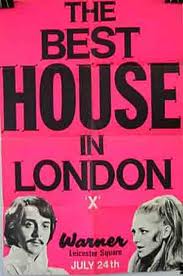
THE BEST HOUSE IN LONDON
UK, 1969, 107 minutes, Colour.
David Hemmings, Joanna Pettit, George Sanders, Warren Mitchell, Dany Robin, Martita Hunt, John Bird, Maurice Denham.
Directed by Philip Saville.
The Best House in London is a moderately successful British satire. written by the radio personality, Dennis Norden. Directed by Philip Saville, who has directed such films as the adaptations from the stage of Stop the World I Want to Get Off and Oedipus the King, it is very strong in atmosphere of Victorian England. It satirises the hypocrisy and the repressed evil under the surface of this society. David Hemmings was popular at this time and has a double role. George Sanders is perfectly cast as the suavely villainous hypocritical politician. There are a number of stars from British comedy in strong supporting roles giving the film some force.
1. An enjoyable British comedy? The British traditions of comedy and satire?
2. The Victorian era as the object of British satire? Its emphasis on externals and respectability, the various kinds of hypocrisy: social, manners, morals, political? How much of the film was accurate and telling satire? how much shrewd observation of foibles and self-deceptions of this period ? How much sheer humour on the period?
3. The importance of colour, decor, sets and costumes? An authentic feel and atmosphere of Victorian London?
4. The significance of the title, its euphemism for a brothel? Audience response to the theme, the title, the focus on the brothel and the implications as regards prostitutes, social concern, the concern and the hypocrisies of the era?
5. The intricacies and involvements of the plot? The echoes of 19th century romantic adventure novels? Serials? A mocking presentation of a Victorian story? The quality of Dennis Norden’s dialogue and wit? The quality of humour, parody, how well was it sustained?
6. The significance of David Hemming's portraying two characters? The two faces of the Victorian man - innocent naive hero, calculating hypocrite and exploiter? How well did he portray each character?
7. Benjamin as the innocent hero? His personality, his work as a publicity agent, his relationship with Josephine, his concern for the Women's Militant Organization, for the prostitutes? Benjamin as the gentleman? His being framed, victim? Victorian ideals and manners, love for Josephine? Plot, prison, release, dangers with Josephine? The details of character, the hero as humorous?
8. The contrast with Walter and the fiend? His relationship with Sir Frederick? Manners, suavity, respectable surface, evil, his management of clubs? His Victorian designs on Josephine? Thing and the ironic connection and ending? A satisfying contrast with Benjamin?
9. Josephine as earnest Victorian heroine? The new woman. Militancy, concern, social awareness? Her naivety, shrewdness? The ambiguities of this militant activism? The background of money, relationship with Benjamin and Walter and the contrast? Kidnapping, dangers? Her final decisions?
10. George Sanders' suave style as Sir Frederick and what he communicated as regards Victorian gentlemen and their hypocrisy, social status, wealth, manipulation? Lack of moral tone? His death and its implications?
11. The contribution of the gallery of minor characters: the prostitutes, the active women, the girls, the maids (and the maid's seduction?), the servants, the politicians, the clients, kidnappers?
12. The significance of the gallery of historical characters and the particular attitudes of Victoriana that they represented? Satisfying parody with these real characters?
13. The parody and the underlying issues of sexuality, drugs, violence. money, political power, power play, organizations?
14. The film's eye for detail, sophisticated veneer, parallels with present concerns?
15. How enjoyable, risque, of social value via parody?
Published in Movie Reviews
Published in
Movie Reviews
Tagged under